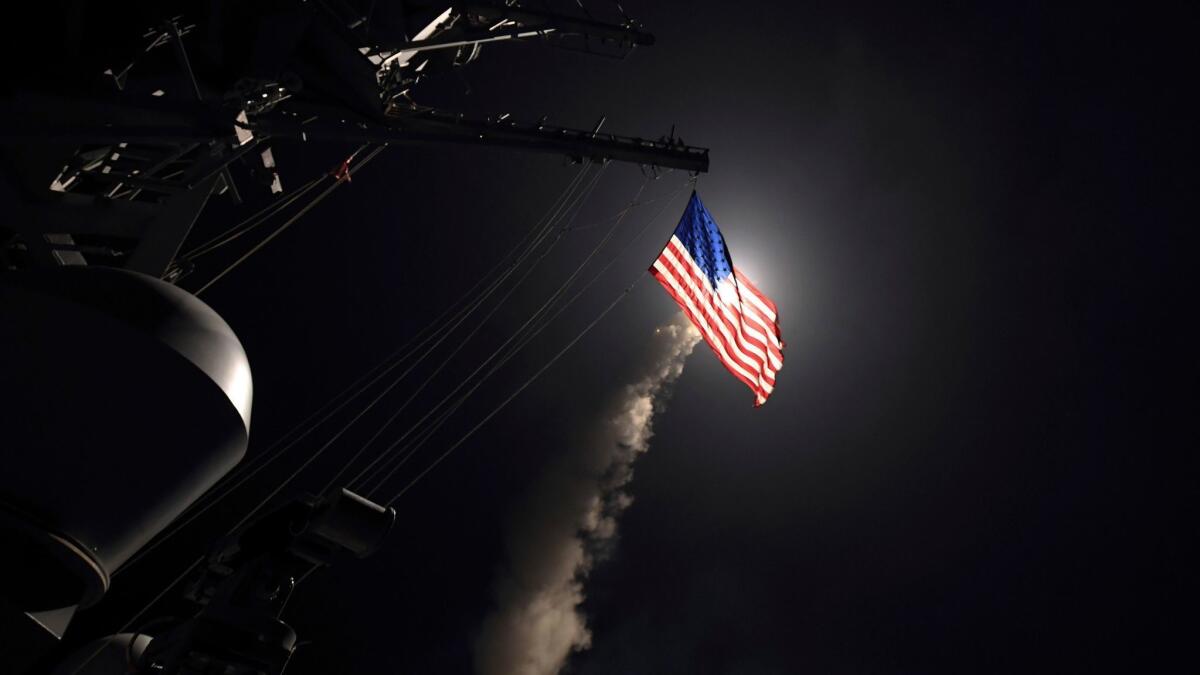Op-Ed: Trump will launch a missile strike against Syria and declare the mission a success. Donât believe it

Soon, perhaps by the time you read these words, President Trump will launch a missile strike against Syria.
It may be small; it may be large. It may include French and British aircraft as well as U.S. missiles. Either way, it will enable Trump to declare victory and applaud his own resolve, probably on Twitter. (Thatâs where he issued his missile warning on Wednesday: âGet ready Russia, because they will be coming, nice and new and âsmart!ââ)
But the attack wonât have much effect, because it isnât connected to a clear, coherent strategy.
The missile strike will accomplish one narrow goal: It will reaffirm the international norm against using chemical weapons. Thatâs a good thing.
But it wonât change much on the ground. It wonât alter the course of Syriaâs seven-year war, which Bashar Assad is winning with help from Russia and Iran. It wonât even protect Syrian civilians from future chemical attacks. Itâs mostly about us â and mainly about the presidentâs irritation that his âred lineâ has been ignored â not about them.
At the most basic level, Trumpâs missile strike will be aimed at punishing Assad for dropping chemical weapons on a neighborhood full of children, and deterring him from doing it again.
Just as Obama found, there are no easy choices in Syria, let alone easy victories.
But the Syrian president, âAnimal Assadâ in Trumpâs tweets, is willing to absorb the punishment. He proved that after the U.S. missile strike against a Syrian airbase last year.
That attack was intended to deter, too, but Assad resumed using chlorine gas after a few months. For the Syrian leader, the chance to eliminate pockets of opposition and demoralize his enemies by suffocating their children is worth the risk.
An effective deterrent would require a much larger action than last yearâs pinprick strike. Trump would need to promise that future attacks will be met with a continuing, escalating campaign against Syrian military assets.
But that would draw the United States more deeply into the Syrian war, a step Trump has resisted, just as Barack Obama did. In 2011, Obama declared that Assad must go, but he never found a way to enforce that wish at an acceptable cost. It was his greatest foreign policy failure.
Then, as now, the U.S. had clear interests in Syriaâs fate, well beyond the warâs terrible cost in human lives. Assadâs brutal rule has helped spawn terrorist opposition groups, including Islamic State, which briefly ruled much of Syria and Iraq. An Assad victory could turn Syria into a permanent base for Iranian military units on Israelâs northern border. (The country is already a base for Russiaâs navy on the Mediterranean.)
Now itâs Trumpâs turn to grapple with a no-win situation. American interests havenât changed, but there is one new factor: About 2,000 U.S. troops are in eastern Syria, finishing up the war against Islamic State, also known as ISIS.
The U.S. military is wrestling with a practical problem: Once Islamic State is defeated, what happens to the desert territory that pro-American forces have gained?
Last year, Defense Secretary James N. Mattis and then-Secretary of State Rex Tillerson announced a strategy of sorts. U.S. forces will remain in eastern Syria to help those local forces establish a provisional government, in a de facto American protectorate.
âWhat we are going to do is hold that territory and get it back in local leadersâ hands,â Mattis said a few weeks ago, âand assure that ISIS 2.0 doesnât rise in the middle of all of that and derail everything weâre fought for.â At that point, he said, it will be up to the United Nations to restart its sputtering Geneva peace negotiations and produce a âpost-conflict plan for the way ahead.â
But thereâs a flaw in that strategy: President Trump doesnât like it, especially if it means a long-term commitment. âI want to get out â I want to bring our troops back home,â Trump said last week. âItâs time. We were very successful against ISIS.â
Trump reportedly told Mattis that U.S. troops could stay in Syria for now â but only for âmonths, not years.â Meanwhile, he ordered the State Department to halt reconstruction aid to the area.
Thatâs not going to work. Trump has suggested that Saudi Arabia or other Arab governments could take the mission over, but the Saudis are inexperienced and unready. The Assad regime will do its best to undermine any effort to establish a competing government in its eastern provinces. It is experienced and ready. And the Geneva process will take a very long time. The United Nations has been trying to negotiate a peace agreement without success since 2012. A declaration that the U.S. is there for âweeks, not monthsâ is a virtual invitation for Assad to wait us out.
Just as Obama found, there are no easy choices in Syria, let alone easy victories. Trump will declare his missile strike a resounding win, but donât believe it. No strategy, no success.
Doyle McManus is a contributing writer to Opinion.
Twitter: @DoyleMcManus
Follow the Opinion section on Twitter @latimesopinion or Facebook
More to Read
A cure for the common opinion
Get thought-provoking perspectives with our weekly newsletter.
You may occasionally receive promotional content from the Los Angeles Times.











